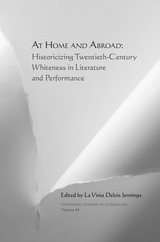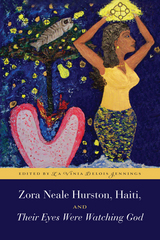
Drawing upon racialized, national practices implemented prior to and during the twentieth century, each of the essays enlists literature or performance to reflect the sociopolitical imperatives that secured whiteness in the respective locations they study. They range from examinations of whiteness in the literature of Appalachia and contemporary Argentinean poetry to an analysis of performances memorializing the colonial experience in Italy and an exploration into the white rap music of Eminem and contemporary multiracial passing.
As the contributors show, literary and performance representations have the power to chronicle histories that reflect the behaviors and lived realities of our selves. Whether whiteness, in addition to its physical manifestation, presents itself as identity, symbol, racism, culture, social formation, political imposition, legal imposition, or pathology, it has been outed into the visible, even in national spaces where the term “whiteness” has yet to be translated and entered into the official lexicon.
The ten essays collected here provide powerful insights into where and how the race for biological and genealogical whiteness persists in various geopolitical realms and the ways in which Nordic whites, as well as ethnic whites and nonwhites, resecure its ascendance.
La Vinia Delois Jennings is professor of English at the University of Tennessee, Knoxville. Her recent critical study Toni Morrison and the Idea of Africa won the 2008 Toni Morrison Society Prize for Best Single-Authored Book on the Nobel laureate and Pulitzer-Prize winning author.

Zora Neale Hurston wrote her most famous novel, Their Eyes Were Watching God, while in Haiti on a trip funded by a Guggenheim fellowship to research the region’s transatlantic folk and religious culture; this work grounded what would become her ethnography Tell My Horse: Voodoo and Life in Haiti and Jamaica. The essays in Zora Neale Hurston, Haiti, and “Their Eyes Were Watching God” persuasively demonstrate that Hurston’s study of Haitian Voudoun informed the characterization, plotting, symbolism, and theme of her novel. Much in the way that Voudoun and its North American derivative Voodoo are syncretic religions, Hurston’s fiction enacts a syncretic, performative practice of reference, freely drawing upon Greco-Roman, Judeo-Christian, and Haitian Voudoun mythologies for its political, aesthetic, and philosophical underpinnings. Zora Neale Hurston, Haiti, and “Their Eyes Were Watching God” connects Hurston’s work more firmly to the cultural and religious flows of the African diaspora and to the literary practice by twentieth-century American writers of subscripting in their fictional texts symbols and beliefs drawn from West and Central African religions.
READERS
Browse our collection.
PUBLISHERS
See BiblioVault's publisher services.
STUDENT SERVICES
Files for college accessibility offices.
UChicago Accessibility Resources
home | accessibility | search | about | contact us
BiblioVault ® 2001 - 2024
The University of Chicago Press









